In Week 2 of the course we discussed what parts of videogames are actually protected by intellectual property. As Mr. Ripley reminded us, one such part is the code itself. This has interesting implications when the code is not owned by the game’s designer.
One of the issues in videogame copyright today is the legal implication of “mods”—user-created game content developed without the publisher’s permission that imports new elements into the game’s code. For example, Michela Fiorido, who took this class last year, will be publishing an article in the UBC Law Review this month entitled “Moral Rights and Mods: Protecting Integrity Rights in Video Games”, where she suggests that “mods” that only use an underlying game framework in order to create an entirely original creation should be entitled to some intellectual-property rights.
What’s interesting to me is that this is not some novel, amateur creative outlet; this is how many published videogames work. Many successful games are built upon the “framework” of other games, called an “engine”. This functions in much the same way that amateur mods do.
While mods are done without the legal “permission” of the original creator, it’s interesting to look at the results when an “above-the-board” game-engine licensing agreement goes legally wrong.
For me, one of the most fascinating lawsuits to occur in recent years was Silicon Knights v Epic Games. A lawsuit that captures some of these implications for intellectual-property law, the psychological elements of litigation, and a psychological horror twist ending.
Information on the lawsuit can be found: here, here, here, and here. I’ll give a brief summary below.
Silicon Knights
Silicon Knights *was* a Canadian game developer headquartered in St. Catherines, Ontario. Led by game designer Denis Dyack, their early releases caught the eye of Nintendo, who partnered with the development company to create games for the GameCube system. Silicon Knights’s first release on the GameCube platform was the psychological horror title, Eternal Darkness.
Eternal Darkness was a Lovecraft-inspired story that contained what was called a “sanity meter”. The sanity meter was a mechanic similar to “health bar”; once filled, the player would experience horrifying and unexpected “twists” that toyed with the player’s expectations, such as the game convincing the player that it had unexpectedly deleted all of her or his saved data.
Eternal Darkness was well-reviewed and won awards for its innovative “sanity meter” game mechanic. After the success of the title, Silicon Knights ceased their partnership with Nintendo in favour of developing games for Microsoft’s Xbox 360 platform. The first title to be released under this new agreement was to be the action-RPG Too Human.
The Unreal Engine
In order to take full advantage of the graphical capabilities of the Xbox 360, Dyack and Silicon Knights licensed the Unreal Engine 3 from Epic Games. The Unreal Engine is a development tool-kit that provides a framework for the game code. Essentially, the engine takes the developer most of the way towards completion of the product, leaving the game developer to only insert the proprietary elements of characters, locations, etc.
The Unreal Engine 3 is one of the most successful licensed game engines. Top-selling games such as Batman: Arkham Asylum and Bioshock: Infinite have utilized the engine. Unfortunately, Too Human was not a top-selling game.
Upon release, Too Human was plagued by poor reviews and complaints of faulty controls and gameplay elements. In interviews, Dyack blamed Epic, saying they had provided a flawed game engine that Silicon Knights had to entirely remake, straining resources and preventing the release of a polished product.
But finger pointing was not enough for Dyack. The disappointing reception of Too Human needed retribution, litigious retribution.
The Lawsuit
Dyack and Silicon Knights sued Epic Games in North Carolina. Alleging contractual breach, Silicon Knights claimed that Epic used the licensing fees they acquired from the Unreal Engine to improve the quality of their own games (primarily, Gears of War), at the expense of the licensees. Essentially, the contract required Epic to provide support to the licensees in the form of “engine specific” upgrades and updates. Silicon Knights claimed that the work being done by Epic in polishing its Gears of War title was upgrading the Engine, and Silicon Knights had a contractual right to the new code. Epic replied that the coding upgrades implemented in Gears of War were “game specific”, and were not required to be shared with the licensees. Silicon Knights was claiming that Epic was taking their licensing fees and using it to upgrade the engine for the sole benefit of Epic’s games (Too Human’s competition) at the detriment of the licensees.
Silicon Knights claimed that, although they were contractually bound to use the Unreal Engine, it was unworkable in its then-current state and updates were overdue. Silicon Knights was therefore forced to start over and create their own engine in order to meet their publisher’s demands.
Other claims, such as an unjust enrichment claim for profits from Gears of War, were also advanced.
The Counterclaim
In response to the suit, Epic counterclaimed for breach of contract on the part of Silicon Knights (for abandoning the Unreal Engine), misappropriating trade secrets, and infringing Epic’s copyrights in the Unreal Engine code. Epic claimed that Silicon Knights, in developing their own engine, had, in fact, copied code, line by line, from the Unreal Engine, scrubbing out the internal copyright references and developer’s commentary. They alleged bad faith on the part of Silicon Knights in stealing the proprietary code and then covering it up.
The Judgment
There’s a scene at the beginning of Rocky IV where Apollo Creed challenges the Russian champion, Drago, to a boxing match in America. Apollo, full of confidence, organizes a ridiculously over-the-top, seemingly jingoistic, Vegas boxing match where he’s mechanically lowered to the ring, wearing stars-and-stripes boxers, and grinning like an fool, to the tune of “Living in America” as performed by James Brown live.
Drago then proceeds to, literally, kill Apollo with his fists.
That scene is what I think of when I read about the results of this trial. The jury, the same jury requested by Silicon Knights, not only rejected the claims of Silicon Knights, but found in favour of Epic. Silicon Knights was ordered to pay US$4.45 million in damages, another US$4.678 million in Attorney fees, and injunctive relief was ordered to the effect that Silicon Knights had to immediately destroy not only the engine developed for Too Human, but remove all copies of the game from stores as well as all copies of the game X-Men: Destiny, which was developed by Silicon Knights following Too Human and was found to have used the Silicon Knights engine that was infringing the copyright of Epic. All of this was at Silicon Knights’s expense.
The Fallout
Silicon Knights was financially ruined. It laid off most of its staff and Dyack left the company. What was once a promising game company was ruined by an aggressive and unnecessary lawsuit. The lawsuit against Epic was initiated by Dyack, and Dyack’s statement’s in the media made it seem to be motivated by ego more than anything. Dyack seemed to want someone to blame for the bugs in Too Human.
After the implosion of his company, Dyack left to form a new studio, Precursor Games. He is currently in the process of crowd funding a “spiritual follow-up” to Eternal Darkness. While Nintendo owns the copyright to the game, Dyack insists it will not be a direct sequel, but will be an original story that incorporates the award-winning game mechanics he developed for the first game. One problem: the patent for the ‘sanity meter’, the central component for those mechanics, is also owned by Nintendo.
In Eternal Darkness, the sanity-meter mechanic would sometimes create a situation where, when trying to reload a weapon, the character would accidentally shoot himself. In many ways, Dyack succeeded in making his sequel to Eternal Darkness: it was his lawsuit against Epic.
Conclusion
Do the legal consequences for Silicon Knights suggest that courts are unlikely to take kindly to the rights claimed for “mods” that utilize the copyrighted underlying game code? Too Human was clearly an original product, yet it has been banished from the face of the earth like a dollar store Mickey Mouse clone.
Thoughts?
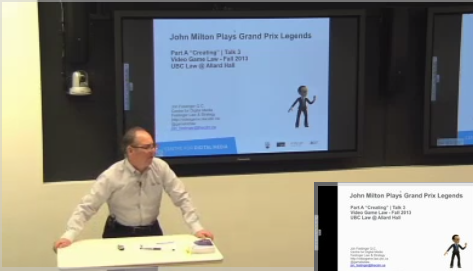
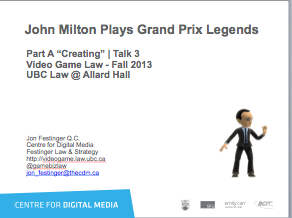
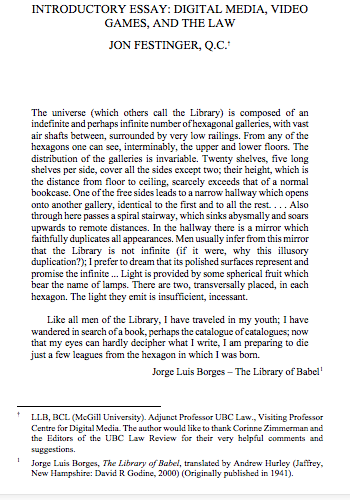

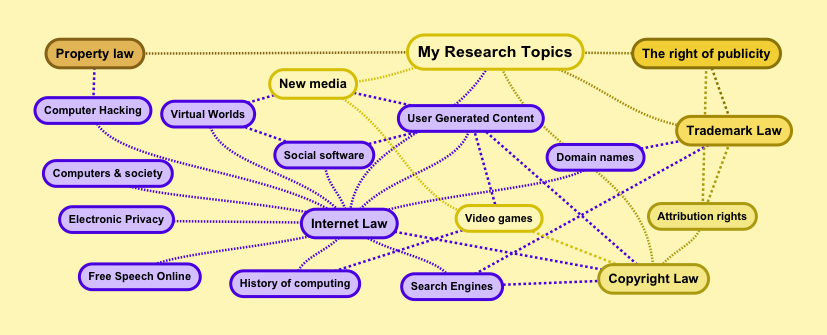

 jon
jon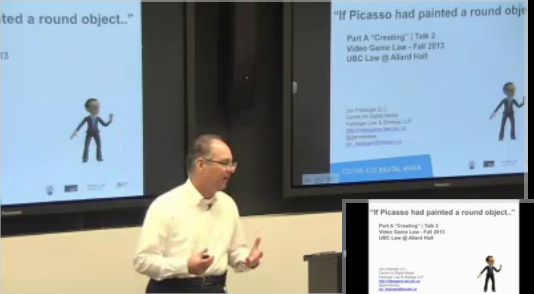
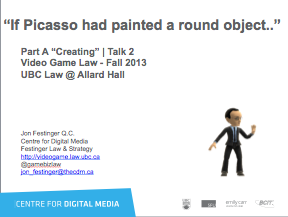
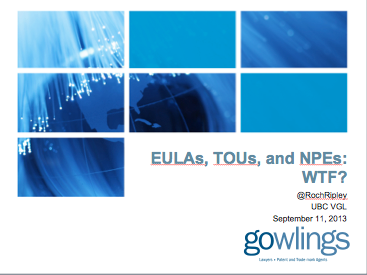
 Communications Law
Communications Law